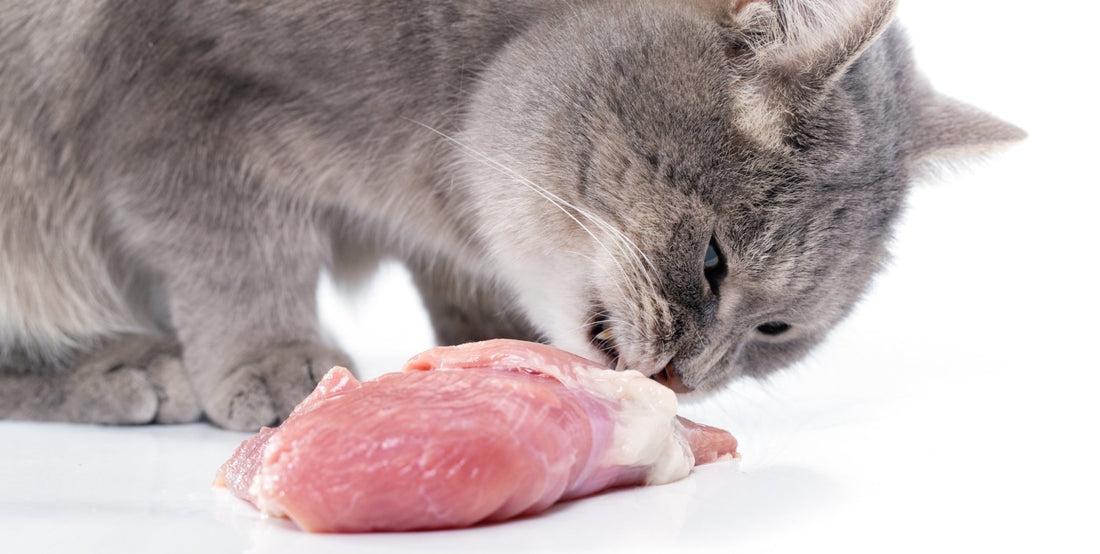
Why Your Cat Needs Taurine And The Best Sources For It (Dogs Too!)
Share
You may have recently heard lots of buzz about heart disease and DCM (Dilated Cardiomyopathy) and how it may or may not be linked to grain-free pet food. That’s an ongoing investigation by the FDA and as of today (Jan 2021), there has been no definitive cause-and-effect relationship noticed. However, DCM is not a new disease. For decades, veterinarians have been diagnosing dogs and cats with DCM. One of the common causes of DCM has been taurine deficiency.

What is DCM?
DCM (Dilated Cardiomyopathy), is the heart’s inability to pump enough blood through the vascular system. This is often attributed to thinning and weakened cell walls of the heart. The inefficient pressure when pumping causes blood to back up in the chambers and the heart gets enlarged, often leading to heart failure. Commonly seen signs of DCM are elevated heart rate, coughing, fainting, decreased appetite, and pale gums. Your veterinarian can perform tests to definitively diagnose DCM.
What is Taurine and how does it impact your cat or dog?
Taurine is one of the amino acids your pet's body uses to grow and repair tissue. It is one of the building blocks of protein. Some of these amino acids are naturally and abundantly produced in our pet’s bodies, while others are not or cannot be created in quantities that the body needs. Therefore they must be introduced through diet. These are called “essential amino acids”. Taurine is an essential amino acid for cats, as they cannot naturally produce enough taurine for their needs.
Taurine helps with normal fetal development, neurological cell protection, nerve growth, bile salt production, protects against retinal degeneration, and is vital to the the development of the vascular and nervous systems.
A taurine deficiency in cats often leads to impaired vision, digestive failure, and DCM. DCM is the most common cause of heart failure in cats. During a cat’s pregnancy, low taurine levels results in fetal abnormalities and low birth weights. For growing kittens, low taurine leads to developmental delays and stunted growth.
Most dogs can naturally produce sufficient amounts of taurine, but some breeds cannot and require a dietary supplementation of taurine. Those breeds are Irish Wolfhound, Newfoundlands, Retrievers, Spaniels, and Saint Bernards. For most other breeds, additional taurine may help guard against liver and glucose disorders.
Where is taurine found?
Taurine is found in animal protein and is necessary for normal heart, brain, and vision function in all mammals. Most mammals naturally produce enough taurine to sustain a healthy life. Cats cannot. Because cats cannot synthesize the necessary quantity, it is a mandatory ingredient in all balanced cat food and diets.
In everyday fowl; chicken, duck, and turkey hearts and muscle meat have high levels of taurine. The heart is the hardest working muscle in the body and contains the most taurine. The faster the heartbeat, the more taurine it holds. Chicken, duck, and turkey have an average heart rate of 200-400 beats per minute. In comparison, a human heart beats approximately 80 times per minute.
Additionally, shellfish have exceptionally high levels of taurine, particularly mussels, clams, and oysters. What cat or dog doesn’t enjoy seafood?
How to add taurine to your pet’s diet
Because there is no risk when feeding taurine from natural sources, we at Homescape Pets believe in frequently treating your cat or dog to treats made from high-quality proteins, rich in taurine such as dehydrated chicken hearts, green lipped mussels, and dehydrated beef hearts, which you can shop for here. For the more finicky pets, these treats can be crushed and added as meal toppers, or rehydrated for a chewy, meatier texture. No matter how your pet likes them, rest assured that they’ll be getting the taurine they need for a healthier, happier life.
